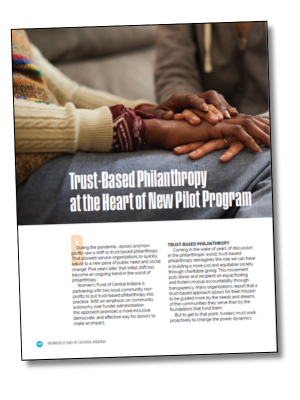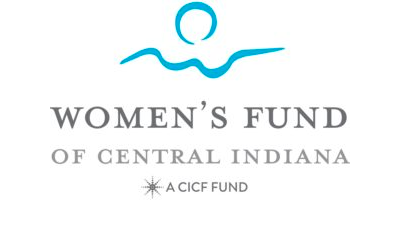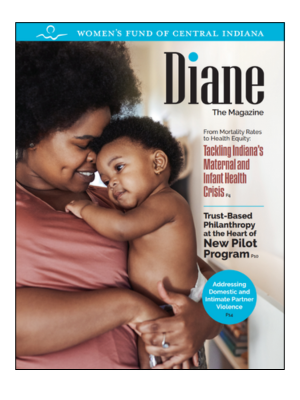 During the pandemic, donors and non-profits saw a shift to trust-based philanthropy. That allowed service organizations to quickly adjust to a new pace of public need and social change. Five years later, that initial shift has become an ongoing trend in the world of philanthropy.
During the pandemic, donors and non-profits saw a shift to trust-based philanthropy. That allowed service organizations to quickly adjust to a new pace of public need and social change. Five years later, that initial shift has become an ongoing trend in the world of philanthropy.Women’s Fund of Central Indiana is partnering with two local community non-profits to put trust-based philanthropy into practice. With an emphasis on community autonomy over funder administration, this approach promises a more inclusive, democratic and effective way for donors to make an impact.
TRUST-BASED PHILANTHROPY
Coming in the wake of years of discussion in the philanthropic world, trust-based philanthropy reimagines the role we can have in building a more just and equitable society through charitable giving. This movement puts donor and recipient on equal footing and fosters mutual accountability through transparency. Many organizations report that a trust-based approach allows for their mission to be guided more by the needs and dreams of the communities they serve than by the foundations that fund them.
But to get to that point, funders must work proactively to change the power dynamics and structural barriers that get in the way of nonprofits’ intended impact.
A trust-based approach relies on six interrelated principles:
- Fewer requirements for application
- Multi-year, unrestricted funding
- Non-financial forms of support
- Simplified administration during the grant period
- Transparent and responsive communication
- Solicitation of and reaction to feedback
WOMEN’S FUND PILOT
Women’s Fund of Central Indiana is piloting a trust-based philanthropy approach with two grantee partners, Constructing Our Future and Pretty Passionate Hands.
Each year for three years beginning in 2024, these grantees will receive $35,000 in unrestricted operating funds plus $2,500 in professional development and wellness support for their executive directors. No application is necessary for year one. For years two and three, grantees need only complete year-end reports to obtain the following year’s funding.
Staff at Women’s Fund will work closely with grantees to ensure the process remains as streamlined and flexible as possible.
Staff will also collaborate with grantees to identify outcomes and a system of reporting that benefits all parties. Women’s Fund will offer additional support outside of funds (trainings, connections, etc.) to help organizations reach their goals.
PILOT ORGANIZATIONS
Constructing Our Future
COF provides re-entry housing and assistance for women newly released from prison. It rents a house in Broad Ripple with capacity for up to four women. Rent payments come out of a set portion of take-home earnings once residents find employment (15% of take home pay the first 90 days, 25% the following 90 days), with a maximum monthly payment of $425.
Residents are expected to work full-time or attend ongoing education while working part-time. COF provides case management and other assistance while also hosting small events at the house for women in the Indiana Women’s Post Incarcerated Network.
The organization was founded at the Indiana Women’s Prison by incarcerated women. Its current board includes those who have transcended structural barriers to re-entry to become successful, contributing members of their community. Rheann Kelly, one of COF’s founders, states it plainly when she laments how incarcerated women are viewed as if they were “abandoned houses… having no value.” She and others at the COF offer a convincing rebuttal in the value they have generated for others seeking to re-enter society.
Women’s Fund has provided COF with technical assistance and funding since the organization’s inception, including a capacity grant in 2019-2020 which resulted in a stronger governance structure.
Pretty Passionate Hands
This organization provides services, support and guidance to teen mothers (and their partners) who have little or no adult support.
Beginning with a focus on their essential needs, PPH offers mentorship, a food and hygiene pantry, group discussions, educational workshops (e.g., CPR, lactation, nutrition, safe sleeping habits for infants), mental health discussions, monthly family dinner, assistance with accessing services, diapers, and co-parenting workshops.
Clients come to the office on Saturdays from noon to 6 p.m. Involved fathers are encouraged to attend.
PPH is currently serving 14 teen moms, with a goal of serving up to 20. Its new program, My Sisterhood, discusses mental health issues with women ages 18 and up. The group meets once a month and has assisted over 30 women since it began last year.
Executive director Paradise Bradford has lived experience with teen motherhood. She started the organization to provide support to teen girls of color who found themselves in a situation she already had to navigate.
Though initially self-funded, PPH has received several small grants more recently. In 2023 it received $25,000 from Women’s Fund, $10,000 from The Indianapolis Foundation, and $15,000 from Glick Family Fund.
THE DIFFERENCE TRUST CAN MAKE
Trust-based philanthropy gets to the very heart of what giving is meant to accomplish. By investing in the people and organizations who know their community best, this form of giving acknowledges and accounts for the social divides we seek to join.
“There are many hard-working, passionate and knowledgeable individuals and organizations working every day to ensure women and girls in Central Indiana thrive,” says Tamara Winfrey-Harris, president of Women’s Fund. “Our job at Women’s Fund is to trust and support that expertise. This trust-based philanthropy pilot is an exploration of how we can do our job well — in a way that honors the Central Indiana community and the people who work hardest to address its challenges and seize opportunities.”
This article was published within the August 2024 issue of the Women’s Fund’s Diane magazine.

